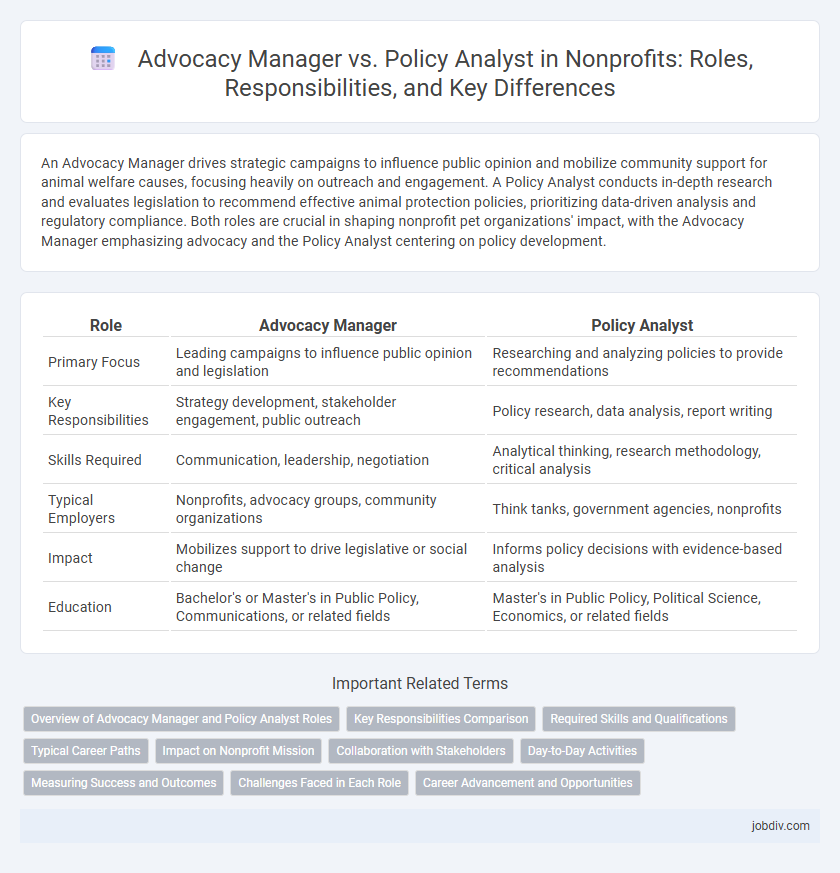An Advocacy Manager drives strategic campaigns to influence public opinion and mobilize community support for animal welfare causes, focusing heavily on outreach and engagement. A Policy Analyst conducts in-depth research and evaluates legislation to recommend effective animal protection policies, prioritizing data-driven analysis and regulatory compliance. Both roles are crucial in shaping nonprofit pet organizations' impact, with the Advocacy Manager emphasizing advocacy and the Policy Analyst centering on policy development.
Table of Comparison
| Role | Advocacy Manager | Policy Analyst |
|---|---|---|
| Primary Focus | Leading campaigns to influence public opinion and legislation | Researching and analyzing policies to provide recommendations |
| Key Responsibilities | Strategy development, stakeholder engagement, public outreach | Policy research, data analysis, report writing |
| Skills Required | Communication, leadership, negotiation | Analytical thinking, research methodology, critical analysis |
| Typical Employers | Nonprofits, advocacy groups, community organizations | Think tanks, government agencies, nonprofits |
| Impact | Mobilizes support to drive legislative or social change | Informs policy decisions with evidence-based analysis |
| Education | Bachelor's or Master's in Public Policy, Communications, or related fields | Master's in Public Policy, Political Science, Economics, or related fields |
Overview of Advocacy Manager and Policy Analyst Roles
Advocacy Managers lead strategic campaigns to influence public policy and mobilize community support for nonprofit causes, often managing stakeholder relationships and public communications. Policy Analysts conduct in-depth research, analyze legislative proposals, and provide evidence-based recommendations to shape policy decisions within nonprofit organizations. Both roles are critical in driving organizational impact, with Advocacy Managers focusing on external engagement and Policy Analysts emphasizing data-driven policy development.
Key Responsibilities Comparison
An Advocacy Manager directs campaigns to influence public opinion and policymakers, mobilizing community support and coordinating outreach efforts, while a Policy Analyst conducts detailed research, evaluates legislation, and develops policy recommendations for organizational decision-making. The Advocacy Manager prioritizes strategic communication and stakeholder engagement, whereas the Policy Analyst emphasizes data analysis and impact assessment. Both roles critically support nonprofit goals but differ in operational focus--advocacy implementation versus policy formulation.
Required Skills and Qualifications
Advocacy Managers require strong communication, strategic planning, and stakeholder engagement skills to effectively promote organizational goals and influence public opinion. Policy Analysts need analytical abilities, research proficiency, and expertise in legislative processes to evaluate policies and provide evidence-based recommendations. Both roles demand a deep understanding of political environments, but Advocacy Managers emphasize relationship-building, while Policy Analysts focus on data-driven analysis and reporting.
Typical Career Paths
Advocacy Managers often progress from grassroots organizing or communications roles, developing expertise in mobilizing community support and managing campaigns to influence public opinion and policy decisions. Policy Analysts typically follow a career path rooted in research, data analysis, and advising governmental or nonprofit organizations on legislative or regulatory issues. Both roles converge in nonprofit environments, with Advocacy Managers concentrating on stakeholder engagement and Policy Analysts providing evidence-based insights to shape effective policy strategies.
Impact on Nonprofit Mission
An Advocacy Manager drives nonprofit mission impact by developing and executing strategic campaigns that mobilize community support and influence public opinion, directly advancing organizational goals. A Policy Analyst enhances mission effectiveness by researching, analyzing, and interpreting policies to provide data-driven recommendations that shape legislative and regulatory environments. Both roles are critical in guiding nonprofits to achieve systemic change, with Advocacy Managers focusing on external engagement and Policy Analysts prioritizing informed policy development.
Collaboration with Stakeholders
Advocacy Managers excel in mobilizing diverse stakeholders, including community groups, government officials, and donors, to drive nonprofit campaigns and influence public opinion. Policy Analysts specialize in researching and interpreting legislation, collaborating closely with experts, legislators, and advocacy teams to provide data-driven recommendations. The synergy between Advocacy Managers and Policy Analysts enhances strategic stakeholder engagement, ensuring effective policy advocacy and impactful social change.
Day-to-Day Activities
An Advocacy Manager directs campaigns, mobilizes supporters, and engages with stakeholders to influence public opinion and legislative decisions, focusing on strategic communication and coalition-building. A Policy Analyst conducts thorough research, evaluates legislation, and prepares detailed reports to advise organizations on policy implications, prioritizing data analysis and evidence-based recommendations. Both roles are integral in nonprofits, with the Advocacy Manager driving action and outreach, while the Policy Analyst shapes informed policy strategies.
Measuring Success and Outcomes
An Advocacy Manager measures success through campaign impact, stakeholder engagement, and shifts in public opinion, using metrics like petition signatures, event attendance, and media coverage. A Policy Analyst evaluates outcomes by analyzing policy changes, legislative adoption, and data-driven impact assessments that demonstrate shifts in social or economic indicators. Both roles prioritize quantifiable evidence but focus on different stages of the advocacy process--outreach and influence versus policy development and evaluation.
Challenges Faced in Each Role
Advocacy Managers navigate challenges related to mobilizing public support, managing stakeholder relationships, and effectively communicating complex issues to diverse audiences. Policy Analysts face difficulties in interpreting legislative changes, conducting rigorous data analysis, and anticipating policy impacts within evolving regulatory environments. Both roles require strategic problem-solving but differ in their emphasis on external engagement versus technical policy evaluation.
Career Advancement and Opportunities
Advocacy Managers typically experience faster career advancement due to their direct involvement in campaign leadership and stakeholder engagement, which hones strategic communication and organizational skills highly valued in nonprofit leadership roles. Policy Analysts gain deep expertise in research and data interpretation, often opening opportunities for specialization in policy development and advisory positions within think tanks and government agencies. Both roles offer distinct career pathways, with Advocacy Managers leaning towards leadership and public influence, while Policy Analysts focus on analytical rigor and policy formulation.
Advocacy Manager vs Policy Analyst Infographic

 jobdiv.com
jobdiv.com